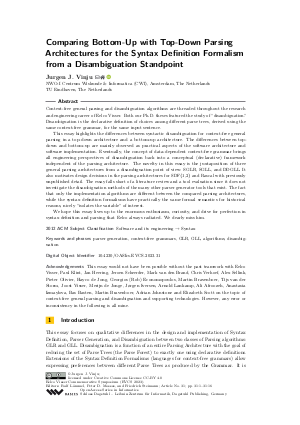@InProceedings{vinju:OASIcs.EVCS.2023.31,
author = {Vinju, Jurgen J.},
title = {{Comparing Bottom-Up with Top-Down Parsing Architectures for the Syntax Definition Formalism from a Disambiguation Standpoint}},
booktitle = {Eelco Visser Commemorative Symposium (EVCS 2023)},
pages = {31:1--31:16},
series = {Open Access Series in Informatics (OASIcs)},
ISBN = {978-3-95977-267-9},
ISSN = {2190-6807},
year = {2023},
volume = {109},
editor = {L\"{a}mmel, Ralf and Mosses, Peter D. and Steimann, Friedrich},
publisher = {Schloss Dagstuhl -- Leibniz-Zentrum f{\"u}r Informatik},
address = {Dagstuhl, Germany},
URL = {https://drops.dagstuhl.de/entities/document/10.4230/OASIcs.EVCS.2023.31},
URN = {urn:nbn:de:0030-drops-178018},
doi = {10.4230/OASIcs.EVCS.2023.31},
annote = {Keywords: parser generation, context-free grammars, GLR, GLL, algorithms, disambiguation}
}

 Creative Commons Attribution 4.0 International license
Creative Commons Attribution 4.0 International license




























